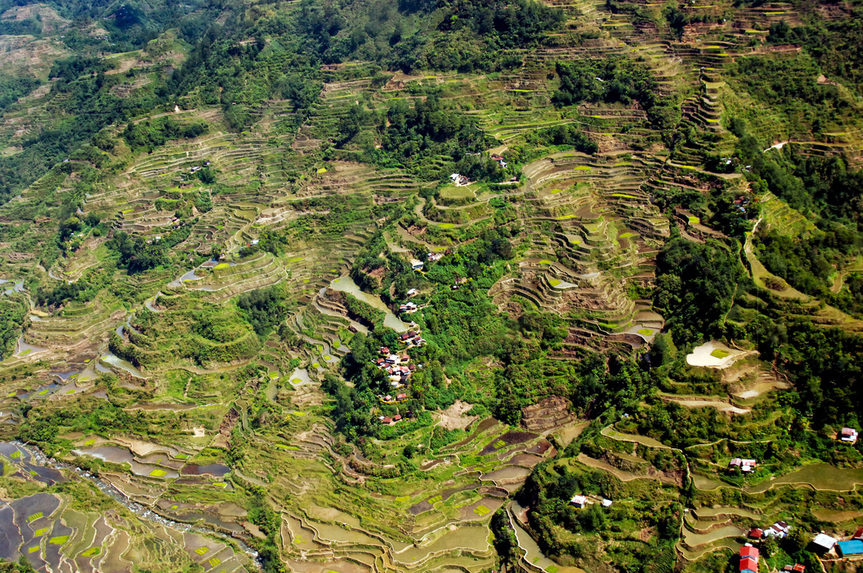2012 University of Guam Archaeological Field School
Kiangan, Ifugao
June 04-July 3, 2012
Field School Description
The University of Guam Archaeological Field School in Kiangan, Ifugao introduces students to the multidisciplinary nature of landscape archaeology research, while also offering insights on relationships between human communities and their environment. The research program has seven goals: 1) introduce students to the multidisciplinary nature of landscape archaeology; 2) provide field research engagement and opportunities to students in the American Pacific; 3) provide hypothesis-driven undergraduate projects with guidance from faculty mentors and international collaborators; 4) encourage students to pursue graduate studies in Anthropological Archaeology; 5) provide students necessary training to work in historic preservation; 6) establish an ongoing research program where students will be able to collaborate with students and professors outside of UOG, and develop scientific-writing skills; and, 7) provide a meaningful field experience to undergraduate participants by directly working with Ifugao descendant communities.
Archaeological fieldwork will be conducted in the Ifugao rice terraces, a UNESCO World Heritage Site, under the direction of Dr. Stephen Acabado (University of Guam), co-directed by Mr. Marlon Martin (CEO-SITMo), Dr. John Peterson (University of Guam), Dr. Ana Maria Labrador (National Museum of the Philippines), and Dr. Grace Barretto-Tesoro (University of the Philippines - Archaeological Studies Program). Each summer for three years (2012-2014), 12 undergraduate students will work with faculty mentors during a summer field program. Students will learn field excavation methods, mapping, and artifact processing. International collaborators include faculty mentors from the National Museum of the Philippines, University of the Philippines, and the Ifugao State University, and, partners from the Save the Ifugao Terraces Movement, Inc., a leading heritage conservation grassroots-NGO.
Summer 2012 Field School
Students participating in the 2012 field season will learn how to conduct archaeological field research; will learn and conduct ethnographic research; will share the results of their studies by writing research papers and public presentations; and, will be involved in public outreach activities. The 2012 field season (and succeeding field seasons) will be divided into blocks of activities, geared towards achieving the goals of the project. Activities include participation in surface mapping, archaeological excavations to learn the methods and processes involved in archaeological field research, processing of artifacts while in the field, ethnographic interviews, and laboratory analyses. Lectures, discussions, and one-on-one meetings will be held every evening to guide students to complete their research projects.
Participants will learn archaeological field techniques by working in real field conditions, working with students and staff from the USA, the Philippines, and the Luce Asian Archaeology Program of the Department of Anthropology, University of Hawaii-Manoa. The 2012 field season will concentrate on the Old Kiyyangan Village, Municipality of Kiangan, Ifugao.
Students will learn:
* use of GPS in field survey
* identifying artifacts and ecofacts
* identifying features and sites
* documenting archaeological sites
* the landscape archaeology approach
* ethnographic interviewing
* site survey techniques
* soil classification and description
* artifacts, feature and site sketching
* field analysis of common artifacts types
* scientific field photography
Location
The 2012 University of Guam archaeological field school will take place in the town of Kiangan, Ifugao, Philippines. The town is located in the North Central Cordillera, northern Philippines, about 8 hours drive from Manila.
Course Credits
Undergraduate and graduate students will receive 6 academic credits:
AN490/G: Field Methods in Landscape Archaeology
Costs and Expenses
Tentative course fees are $4,000.00, which include all tuition, food, housing and travel within the Philippines. The participant is responsible for travel to and from the Philippines (about $1100-$1500 from the US), visa fees, health insurance and personal cash.
Notes
Archaeological work involves physical work in the outdoors. You should be aware that conditions in the field are different than those you experience in your home or college town. You will be required to engage in moderate to rigorous climbs. Please bring appropriate footwear and clothing to protect yourself. If you have any concerns, discuss them with your doctor and/or project director as appropriate.
Application
Application forms should be submitted as soon as possible. The deadline is February 28, 2012.
Application form (Click here)
for inquiries: [email protected], 671-735-2809

